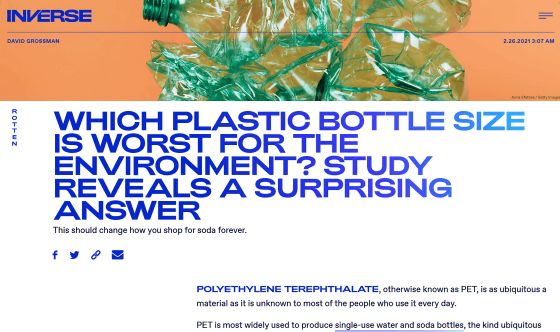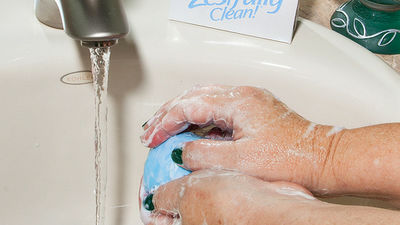What is the capacity of the most environmentally friendly PET bottles on earth?

Beverage bottle capacity, packaging efficiency, and the potential for plastic waste reduction | Scientific Reports
https://www.nature.com/articles/s41598-021-82983-x
Plastic bottles holding 2.3 litres are least harmful to the planet | New Scientist
https://www.newscientist.com/article/2269358-plastic-bottles-holding-2-3-litres-are-least-harmful-to-the-planet/
Which plastic bottle size is worst for the environment? Study reveals a surprising answer
https://www.inverse.com/science/which-bottle-size-to-choose

Although PET bottles are known as recyclable materials, not all PET bottles that are actually discarded are recycled and a significant amount is sent to landfills each year.
Many scientists are tackling the problem of plastic waste because plastic waste, including PET bottles, has a significant impact on the global environment. Therefore, Rafael Becerril-Arreola, an assistant professor of marketing at the University of South Carolina in the United States, thought that reducing PET waste could be achieved by maximizing the content of PET bottles per PET usage, and said, 'Various sizes. Weigh the PET bottles and determine the size with the largest content per weight. '

Becerril-Arreola's research team collected 187 PET bottles of various capacities sold by mainstream beverage brands and weighed the PET used by a particular bottle. Measurements show that small bottles less than 16 ounces have a significantly heavier PET weight per capacity than medium-sized bottles of 16-100 ounces and large bottles of 100 ounces or more. Turned out. In addition, the researchers found that the bottle with the lightest PET weight per capacity had a capacity of '2.3 liters.'
Becerril-Arreola pointed out that the basic design of PET bottles is related to this result. All PET bottles have a common mechanism around the cap, and the weight of this part is almost constant regardless of the total capacity. Becerril-Arreola explains that small bottles generally weigh more per volume than large bottles because this part does not include the beverage itself. We also found that medium-sized bottles are more efficient than large-sized bottles because the shape of PET bottles changes to withstand the weight of large-sized bottles.
The factors that determine the weight of PET bottles are 80% capacity and 16% product categories (beverages such as carbonated drinks, non-carbonated drinks, and juices), and the amount of PET used per capacity is juice]. Soft drinks] It seems that the number of non-soft drinks is the highest.

In addition, the research team will collect and disclose the amount of PET waste by the state government, analyze the data of Minnesota where the consumption of PET bottled beverages is close to the US average, and compare the sales of PET bottled beverages with the amount of PET waste. Implementation. Then, it was confirmed that the amount of PET waste was small when the sales of medium-sized bottles were high, and the amount of PET waste was large when the sales of small bottles were high.
Next, the research team used national data on PET waste to see how much PET waste could be reduced in a year in the scenario of '20% of small bottle sales shifted to medium-sized bottles.' I simulated it. The results show that simply replacing small bottle sales with medium-sized bottle sales could reduce nearly 9000 tonnes of PET waste annually.
In recent years, public health officials are considering reducing the size of PET bottles, believing

Related Posts:







